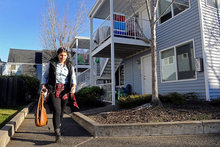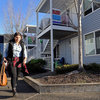0
Report
Community:
Jan 9, 2019
In 2018, communities across the country faced a continuing housing affordability crisis—and, in some places, natural disasters—that strained the ability of local actors to address homelessness. After declining for almost a decade, the number of people experiencing homelessness in the United States increased for the second year in a row.
Authored by: Oriya Cohen for How Housing Matters
Topics: Homelessness, Housing, Racial inequalities, Research
 Shared by Mica O'Brien
Shared by Mica O'Brien
Mica O'Brien posted a
on Jan 10, 2019
Oriya Cohen for How Housing Matters
In 2018, communities across the country faced a continuing housing affordability crisis—and, in some places, natural disasters—that strained the ability of local actors to address homelessness.
0
News Article
Community:
Jan 7, 2019
Kansas officials see a solution to chronic homelessness and the burden placed on state institutions, jails and law enforcement in the work of a psychiatrist who believes mentally ill people can help themselves without any strings attached. The idea is to provide those who need treatment with unconditional housing and the support services they need, even if they are substance abusers who are likely to violate traditional program requirements for curfew and sobriety.
Authored by: Sherman Smith for The Topeka Capital-Journal
Topics: Criminal justice, Homelessness, Housing, Low-income, Mental health, Preventative care, Supportive housing
 Shared by Mica O'Brien
Shared by Mica O'Brien
Mica O'Brien posted a
on Jan 10, 2019
Sherman Smith for The Topeka Capital-Journal
Kansas officials see a solution to chronic homelessness and the burden placed on state institutions, jails and law enforcement in the work of a psychiatrist who believes mentally ill people can help themselves without any strings attached.
0
News Article
Community:
Jan 6, 2019
According to a new study, the Las Vegas metropolitan area’s share of voucher recipients with children living in low-poverty neighborhoods, one-third, is greater than the share of voucher-affordable rentals located in those same neighborhoods, one-fourth. That’s possible because affordable rentals far outnumber voucher recipients.
Authored by: Michael Scott Davidson for Las Vegas Review-Journal
Topics: Asset building, Education, Housing, Low-income, Mobility, West Coast
 Shared by Mica O'Brien
Shared by Mica O'Brien
Mica O'Brien posted a
on Jan 10, 2019
Michael Scott Davidson for Las Vegas Review-Journal
According to a new study, the Las Vegas metropolitan area’s share of voucher recipients with children living in low-poverty neighborhoods, one-third, is greater than the share of voucher-affordable rentals located in those same neighborhoods, one-fourth.
0
News Article
Community:
Jan 9, 2019
A new government report highlights just how pervasive the problem is.
Authored by: Adam Harris for The Atlantic
Topics: Food insecurity, Low-income, Nutrition, Post-secondary, Research
 Shared by Mica O'Brien
Shared by Mica O'Brien
Mica O'Brien posted a
on Jan 9, 2019
Adam Harris for The Atlantic
A new government report highlights just how pervasive the problem is.
0
Report
Community:
Dec 1, 2018
This 2018 report updates the annual Early Childhood Homelessness State Profiles and provides a snapshot of early childhood data available for children who are experiencing homelessness in each state, plus the District of Columbia and Puerto Rico. It includes publicly available data for 2015—2016 from the U.S. Census Bureau (Census), U.S. Department of Education (ED), U.S. Department of Housing and Urban Development (HUD), U.S. Department of Health and Human Services (HHS), and the Annie E. Casey Foundation.
Authored by: U.S. Department of Education
Topics: Early childhood, Homelessness, Housing, Low-income, Research
 Shared by Mica O'Brien
Shared by Mica O'Brien
Mica O'Brien posted a
on Jan 8, 2019
U.S. Department of Education
This 2018 report updates the annual Early Childhood Homelessness State Profiles and provides a snapshot of early childhood data available for children who are experiencing homelessness in each state, plus the District of Columbia and Puerto Rico.
0
Publication
Community:
Dec 1, 2018
A guide for youths who are or were homeless, or are at risk of experiencing homelessness
Authored by: U.S. Department of Education
Topics: Education, Homelessness, Housing, Low-income, Post-secondary
 Shared by Mica O'Brien
Shared by Mica O'Brien
Mica O'Brien posted a
on Jan 8, 2019
U.S. Department of Education
A guide for youths who are or were homeless, or are at risk of experiencing homelessness
0
News Article
Community:
Dec 20, 2018
The Trump Administration proposed a Supplemental Nutrition Assistance Program (SNAP) rule that would diminish food assistance for unemployed and underemployed people in areas with insufficient jobs; undo long-settled regulations; cynically attempt to end run Congress; and increase hunger and nutrition-related diseases.
Authored by: Emily Pickren for Food Research & Action Center
Topics: Food insecurity, Legislation & Policy, Low-income, Nutrition
 Shared by Mica O'Brien
Shared by Mica O'Brien
Mica O'Brien posted a
on Jan 7, 2019
Emily Pickren for Food Research & Action Center
The Trump Administration proposed a Supplemental Nutrition Assistance Program (SNAP) rule that would diminish food assistance for unemployed and underemployed people in areas with insufficient jobs; undo long-settled regulations; cynically attempt to end run Congress; and increase hunger and nutriti
0
News Article
Community:
Dec 24, 2018
When homeless people get released, their issues combined with living on the street will usually land them back in emergency rooms, costing hospitals like Harborview Medical Center — which operates on a thin margin — time and money. One solution is a type of respite program that provides short-term care to homeless patients who are too sick to be on the streets or in a shelter, but not sick enough to continue to take up a hospital bed.
Authored by: Scott Greenstone for The Seattle Times
Topics: Health, Homelessness, Housing, Pacific Northwest, Partnerships, Place-based, Preventative care, Stability
 Shared by Mica O'Brien
Shared by Mica O'Brien
Mica O'Brien posted a
on Jan 7, 2019
Scott Greenstone for The Seattle Times
When homeless people get released, their issues combined with living on the street will usually land them back in emergency rooms, costing hospitals like Harborview Medical Center — which operates on a thin margin — time and money.
0
Interactive
Community:
Jan 3, 2019
The Housing Choice Voucher Program, the nation’s largest federal rental assistance program, enables families to afford decent, stable housing, avoid homelessness, and make ends meet. This map allows users to examine where voucher-assisted households live in the 50 largest metropolitan areas. Neighborhoods are color-coded according to their poverty rate, score on our opportunity index, share of residents who are people of color, and Home Owners’ Loan Corporation (HOLC) “Residential Security” maps (only available for selected cities).
Authored by: Alicia Mazzara, Brian Knudsen, and Nick Kasprak for Center on Budget and Policy Priorities
Topics: Housing, Mobility, Racial inequalities, Research
 Shared by Mica O'Brien
Shared by Mica O'Brien
Mica O'Brien posted a
on Jan 7, 2019
Alicia Mazzara, Brian Knudsen, and Nick Kasprak for Center on Budget and Policy Priorities
The Housing Choice Voucher Program, the nation’s largest federal rental assistance program, enables families to afford decent, stable housing, avoid homelessness, and make ends meet. This map allows users to examine where voucher-assisted households live in the 50 largest metropolitan areas.
0
Report
Community:
Jan 3, 2019
This analysis examines the location of families with children using vouchers in all U.S. metropolitan areas and in the 50 largest metro areas across multiple neighborhood characteristics. Using Department of Housing and Urban Development (HUD) administrative data and Census Bureau survey data, we compare the location of these families to the location of voucher-affordable units using three measures: neighborhood poverty, an opportunity index, and the share of residents who are people of color.
Authored by: Alicia Mazzara and Brian Knudsen for Center on Budget and Policy Priorities and PRRAC
Topics: Housing, Mobility, Racial inequalities, Research
 Shared by Mica O'Brien
Shared by Mica O'Brien
Mica O'Brien posted a
on Jan 7, 2019
Alicia Mazzara and Brian Knudsen for Center on Budget and Policy Priorities and PRRAC
This analysis examines the location of families with children using vouchers in all U.S. metropolitan areas and in the 50 largest metro areas across multiple neighborhood characteristics.
0
News Article
Community:
Jan 3, 2019
But a new study found that in nearly all 50 of America’s biggest metropolitan areas, low-income families using federal housing vouchers remain overly concentrated in impoverished, racially segregated neighborhoods with little opportunity — even with plenty of affordable apartments available in higher income neighborhoods.
Authored by: Tracy Jan for The Washington Post
Topics: Housing, Mobility, Racial inequalities, Research
 Shared by Mica O'Brien
Shared by Mica O'Brien
Mica O'Brien posted a
on Jan 7, 2019
Tracy Jan for The Washington Post
But a new study found that in nearly all 50 of America’s biggest metropolitan areas, low-income families using federal housing vouchers remain overly concentrated in impoverished, racially segregated neighborhoods with little opportunity — even with plenty of affordable apartments available in highe
0
News Article
Community:
Dec 27, 2018
Basic necessities like food and water have been restored since the October afternoon when the storm pummeled Panama City. But a new crisis has emerged over a need even more primal — housing.
Authored by: Kathryn Varn for Tampa Bay Times
Topics: Child welfare, Health, Housing, Low-income, Safety, South
 Shared by Mica O'Brien
Shared by Mica O'Brien
Mica O'Brien posted a
on Jan 7, 2019
Kathryn Varn for Tampa Bay Times
Basic necessities like food and water have been restored since the October afternoon when the storm pummeled Panama City. But a new crisis has emerged over a need even more primal — housing.
0
News Article
Community:
Dec 31, 2018
The USDA’s rental housing inventory comprises 416,000 subsidized units with an estimated 435,000 residents. Two reports this year found that, in the absence of more federal funding and better planning, the program will shed some 20,000 units by 2027. At that point, analysts predict, the loss rate will accelerate through 2050 with up to another 380,000 units expected to exit the program, gutting the overall supply by 90 percent or more.
Authored by: Martin Kuz for The Christian Science Monitor
Topics: Homelessness, Housing, Low-income, Research, West Coast
 Shared by Mica O'Brien
Shared by Mica O'Brien
Mica O'Brien posted a
on Jan 7, 2019
Martin Kuz for The Christian Science Monitor
The USDA’s rental housing inventory comprises 416,000 subsidized units with an estimated 435,000 residents. Two reports this year found that, in the absence of more federal funding and better planning, the program will shed some 20,000 units by 2027.
0
Publication
Community:
Jan 2, 2019
Housing quality, instability, and unaffordability threaten the well-being of millions of children across the nation. Research shows that housing is the first rung on the ladder to economic opportunity and that a person’s access to opportunity is intrinsically linked with that of the community where they live. As home prices increase, the gap between rents and incomes continues to widen, and nearly half of today’s renters are cost burdened. Child welfare professionals, educators, and pediatricians can strengthen their work by understanding the central importance of housing as a determinant of wide-ranging outcomes for the country’s youngest generation.
Authored by: Veronica Gaitan for How Housing Matters
Topics: Child welfare, Early childhood, Health, Housing, Research, Safety
 Shared by Mica O'Brien
Shared by Mica O'Brien
Mica O'Brien posted a
on Jan 7, 2019
Veronica Gaitan for How Housing Matters
Housing quality, instability, and unaffordability threaten the well-being of millions of children across the nation.
0
Interactive
Community:
Jan 1, 2019
A collection of resources that cover public health issues such as dental care, diabetes, vaccines, and nutrition.
Authored by: Mark Barna for The Nation's Health
Topics: Child welfare, Health, Low-income, Safety
 Shared by Mica O'Brien
Shared by Mica O'Brien
Mica O'Brien posted a
on Jan 7, 2019
Mark Barna for The Nation's Health
A collection of resources that cover public health issues such as dental care, diabetes, vaccines, and nutrition.
0
Report
Community:
Jan 1, 2019
Environmental health services, from asthma home visiting programs to lead testing, can help protect children from the dangerous environmental exposures they encounter every day. But the problem for parents and caregivers is accessing such services, a new analysis from APHA’s Center for Public Health Policy shows.
Authored by: Julia Haskins for The Nation's Health
Topics: Asthma, Child welfare, Health, Healthy homes, Housing, Lead, Low-income, Place-based, Preventative care, Research, Safety
 Shared by Mica O'Brien
Shared by Mica O'Brien
Mica O'Brien posted a
on Jan 7, 2019
Julia Haskins for The Nation's Health
Environmental health services, from asthma home visiting programs to lead testing, can help protect children from the dangerous environmental exposures they encounter every day.
0
News Article
Community:
Dec 27, 2018
The nation’s public housing authorities are seeking closer links to health insurers and medical care providers to address social determinants of health.
Authored by: Bruce Japsen for Forbes
Topics: CLPHA, Funding, Health, Housing, Low-income, Medicaid / Medicare, Partnerships, Place-based, Research
 Shared by Mica O'Brien
Shared by Mica O'Brien
Mica O'Brien posted a
on Jan 7, 2019
The nation’s public housing authorities are seeking closer links to health insurers and medical care providers to address social determinants of health.
0
Publication
Community:
Feb 8, 2018
Homeownership often translates to wealth accumulation, and wealth grows generationally. As a result, the wealth gap between white and black families has grown over the past 50 years. In 2016, white wealth was seven times greater than black wealth. Even if black families own homes, home equity does not necessarily provide the same savings and wealth-building opportunity as it does for white families.
Authored by: Janae Ladet for How Housing Matters
Topics: Housing, Legislation & Policy, Racial inequalities, Research
 Shared by Mica O'Brien
Shared by Mica O'Brien
Mica O'Brien posted a
on Jan 7, 2019
Janae Ladet for How Housing Matters
Homeownership often translates to wealth accumulation, and wealth grows generationally. As a result, the wealth gap between white and black families has grown over the past 50 years. In 2016, white wealth was seven times greater than black wealth.
0
Research
Community:
Sep 12, 2018
Eviction provides a clear window for understanding housing, racial injustice, and poverty in cities. In the face of the eviction crisis, national researchers, community organizers, and other civic actors have rallied together to document data and call attention to this crisis. One of these collective efforts is the Kansas City Eviction Project (KC Eviction Project), a collaboration between researchers, community organizers, neighborhood leaders, lawyers, and policymakers. KC Eviction Project compiled a dataset of evictions in Jackson County, Missouri, which encompasses most of metropolitan Kansas City, Missouri. The data, obtained through county court electronic records, include eviction filings from 1999 to 2017.
Authored by: Tara Raghuveer for How Housing Matters
Topics: Housing, Midwest, Racial inequalities
 Shared by Mica O'Brien
Shared by Mica O'Brien
Mica O'Brien posted a
on Jan 7, 2019
Tara Raghuveer for How Housing Matters
Eviction provides a clear window for understanding housing, racial injustice, and poverty in cities. In the face of the eviction crisis, national researchers, community organizers, and other civic actors have rallied together to document data and call attention to this crisis.
0
Publication
Community:
Aug 22, 2018
Because many children attend elementary schools in their own neighborhood, a child’s access to high-quality schools is dependent on where they grow up. Racial residential and school segregation, along with policies and practices that inequitably distribute resources across neighborhoods and schools, have created a system in which students of color often lack access to high-quality schools compared with white students residing in the same region.
Authored by: Ruth Gourevitch for How Housing Matters
Topics: Child welfare, Education, Low-income, Racial inequalities, Research, Youth
 Shared by Mica O'Brien
Shared by Mica O'Brien
Mica O'Brien posted a
on Jan 7, 2019
Ruth Gourevitch for How Housing Matters
Because many children attend elementary schools in their own neighborhood, a child’s access to high-quality schools is dependent on where they grow up.
0
Interactive
Community:
A building-level interactive map that shows where residential tenants face displacement pressure and affordable apartments are threatened across New York City. Monthly reports on new harassment and displacement risk in rent-stabilized buildings by Community District and color-coded by risk factors.
Authored by: Association for Neighborhood & Housing Development
Topics: East Coast, Housing, Low-income, Stability
 Shared by Mica O'Brien
Shared by Mica O'Brien
Mica O'Brien posted a
on Dec 21, 2018
Association for Neighborhood & Housing Development
A building-level interactive map that shows where residential tenants face displacement pressure and affordable apartments are threatened across New York City. Monthly reports on new harassment and displacement risk in rent-stabilized buildings by Community District and color-coded by risk factors.
0
Publication
Community:
Apr 10, 2018
State and local governments are debating and adopting new landlord-tenant laws and pilot programs, such as expanded legal representation and just-cause eviction requirements. Yet, few housing experts understand evictions well enough to channel the demand for change into clarity about specific eviction problems and potential solutions. Now is the time for policymakers and advocates to get smart. Here are five strategies for policymakers to consider as they address America’s eviction crisis.
Authored by: Maya Brennan for Urban Institute
Topics: Housing, Legislation & Policy, Low-income, Research, Stability
 Shared by Mica O'Brien
Shared by Mica O'Brien
Mica O'Brien posted a
on Dec 21, 2018
Maya Brennan for Urban Institute
State and local governments are debating and adopting new landlord-tenant laws and pilot programs, such as expanded legal representation and just-cause eviction requirements.
0
Publication
Community:
Oct 1, 2016
This report examines strategies used by local governments to address rising housing costs and displacement of low-income households in gentrifying neighborhoods. To assist tenants at risk of displacement, the report details strategies to regulate the landlord/tenant relationship well as strategies to provide assistance for households that move. To create and preserve affordable housing, the report explores ways to use city-owned land and other resources strategically to promote affordable housing in areas where costs are on the rise. It also examines ways to harness the market, such as inclusionary zoning and linkage fees. The report is part of an ongoing series of work by the NYU Furman Center on gentrification, but is the first to provide an overview of policy responses to the effects rapidly rising rents.
Authored by: Jessica Yager, Luke Herrine, and Nadia Mian for NYU Furman Center
Topics: Community development, Housing, Low-income, Stability
 Shared by Mica O'Brien
Shared by Mica O'Brien
Mica O'Brien posted a
on Dec 21, 2018
Jessica Yager, Luke Herrine, and Nadia Mian for NYU Furman Center
This report examines strategies used by local governments to address rising housing costs and displacement of low-income households in gentrifying neighborhoods.
0
Publication
Community:
Dec 1, 2018
New York City’s UAC has generated substantial interest as other jurisdictions across the U.S. consider or implement similar programs. In June 2018, San Francisco voters approved a ballot initiative requiring the city to establish, fund, and run a program to provide legal representation to all tenants facing eviction regardless of income. The Los Angeles City Council approved a motion in August 2018 instructing the housing department to develop recommendations for a new eviction defense bill or program.
Authored by: Vicki Been, Deborah Rand, Nicole Summers, and Jessica Yager for NYU Furman Center
Topics: Housing, Legislation & Policy, Low-income, Stability
 Shared by Mica O'Brien
Shared by Mica O'Brien
Mica O'Brien posted a
on Dec 21, 2018
Vicki Been, Deborah Rand, Nicole Summers, and Jessica Yager for NYU Furman Center
New York City’s UAC has generated substantial interest as other jurisdictions across the U.S. consider or implement similar programs.
0
Case study
Community:
Dec 6, 2018
The Denver Housing Authority (DHA) wins a 2017 Award of Excellence in Client and Resident Services for creating the Health Navigators (HN) program, which provides mental health education, resources, and doctor referrals.
Authored by: Ashanti Wright for Journal of Housing & Community Development
Topics: Disabilities, Health, Housing, Low-income, Medicaid / Medicare, Mental health, Partnerships, Place-based, Seniors
 Shared by Mica O'Brien
Shared by Mica O'Brien
Mica O'Brien posted a
on Dec 21, 2018
Ashanti Wright for Journal of Housing & Community Development
The Denver Housing Authority (DHA) wins a 2017 Award of Excellence in Client and Resident Services for creating the Health Navigators (HN) program, which provides mental health education, resources, and doctor referrals.















